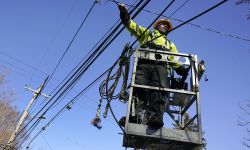Michigan GOP lawmaker goes after Facebook, Twitter for banning Donald Trump

A Republican lawmaker has introduced a bill that would let social media users sue a platform, like Facebook and Twitter, if they are censored for their posts.
The House Communications and Technology Committee held a hearing Wednesday to hear testimony regarding House Bill 5973, which would stop social media companies from banning users by designating companies as common carriers. Common carriers, such as telephone line companies and railroads, are regulated by the government.
Similar bills have been passed in Texas and Florida, but were struck down by federal judges for violating social media platforms’ First Amendment rights. It’s highly likely that the bill, if passed through the committee, House and Senate, would be vetoed by Democratic Gov. Gretchen Whitmer.
Related:
- Audit: Michigan unemployment agency didn’t guard taxpayer info in pandemic
- Michigan suspends contact tracing contract as COVID cases surge
The bill’s supporters argue that social media platforms should allow most speech without censorship, like how it plays out in a “physical public square.” But opponents of the bill warn such a law digs too deep into private company’s operations.
Rep. Ryan Berman, R-Commerce Township, who introduced the bill and testified at the committee hearing Wednesday, said social media companies with more than 50 million users will be affected by the law.
Berman said the bill was prompted was the removal of former President Donald Trump from Facebook and Twitter following his posts about the January 6, 2021, insurrection at the U.S. Capitol. The platforms stated Trump was banned for praising people who raided the U.S. Capitol.
The bans prompted Trump to create his own social media platform Truth Social, which has also banned accounts.
Social media companies require users to voluntarily agree to terms and conditions before creating an account. While the expulsion of the former president made headlines, it’s routine practice for social media platforms to remove accounts considered to be fake (computer bots rather than real people) or harmful. In 2021, for instance, Facebook banned over 1 billion accounts for those reasons.
“If you can’t be banned in the regular physical town square from putting your viewpoints out there, I think you should be protected in the digital age as well,” Berman told Bridge Michigan on Wednesday. “The way you combat misinformation is not silencing someone, it’s by confronting them with facts and truth.”
If social media companies were designated as common carriers, the government could prevent them from censoring a user based on the content they post, such as extremist views or misinformation.
The bill would also allow the state or censored user to sue the company if it removed users for such reasons. Berman said that under his bill, there would not be a public commission that would determine what is and isn’t worth censoring. Instead, a user could sue the company if they feel like they are being discriminated against for their speech.
The user must be using the platform in Michigan in order for the bill to apply to them.
Under the bill, the only time a social media company could censor a user is if they incite criminal activity, including threats of violence against a group or person based on their race, color, disability, religion, national origin or ancestry, age, or sex.
Social media companies would also be allowed to censor content related to the sexual exploitation of children and survivors of sexual abuse.
Texas and Florida have passed bills mirroring Michigan’s and have been challenged in court. Currently, social media companies like Facebook are urging the U.S. Supreme Court to block a Texas law that stops sites from banning users or removing posts based on political viewpoints.
The Texas law went into effect on May 11 after a federal appeals court lifted an earlier ruling from a lower court that blocked it. In June, a federal court judge blocked a Florida law that would allow the state to punish social media sites for banning politicians from their platforms.
Adam Candeub, a Michigan State University law professor who worked for the Trump administration and is an expert witness for Texas in that state’s case, said the government monitoring common carriers is not out of the ordinary.
If social media companies were designated as a common carrier, the government could set their rates and prices as well as their terms and conditions of service for interstate communications.
In his testimony to the House committee Wednesday, Candeub said the government does not have to “impose this full gamut of public utility law,” but is free to choose which regulations should apply to social media companies.
Such regulation would include not discriminating against people by banning them for controversial posts.
“Non-discrimination is one of the oldest obligations of common carriers and requires them simply to accept all users,” Candeub said.
But some who testified against the bill say that it allows the government to dig too deep into a private company’s operations. Jennifer Huddleson, a policy counselor for Net Choice, who is lobbying the U.S. Supreme Court to stop the Texas law from taking effect, said Michigan’s bill would disadvantage new social media platforms.
According to Huddleson, the bill would harm new social media platforms focused on specific communities, such as conservatives or LGBTQ, because they would not be able to monitor the content being posted on their platform.
Huddleson said without social media companies’ ability to remove content, the internet would not be an enjoyable place.
“Notably, YouTube would be unable to prevent children from accessing user-posted videos with violent, hateful or racist content that is inappropriate for children,” Huddleson testified at the hearing on Wednesday.
“State governments are seeking to punish private platforms for moderating their services in ways that they see fit for their customers,” Huddleson said.
The committee did not vote on the bill Wednesday, but may at a later date.
Rep. John Damoose, R-Harbor Springs, and member of the House Communications and Technology Committee, said he doesn’t fully disagree with the bill but he is concerned about the precedent it would set for other businesses.
During the hearing, Damoose questioned why Facebook or Twitter should be considered more of a public square than publications like the New York Times or broadcast networks.
“I get this argument about public square, but it kind of depends on where private businesses fit in,” Damoose said.
See what new members are saying about why they donated to Bridge Michigan:
- “In order for this information to be accurate and unbiased it must be underwritten by its readers, not by special interests.” - Larry S.
- “Not many other media sources report on the topics Bridge does.” - Susan B.
- “Your journalism is outstanding and rare these days.” - Mark S.
If you want to ensure the future of nonpartisan, nonprofit Michigan journalism, please become a member today. You, too, will be asked why you donated and maybe we'll feature your quote next time!




